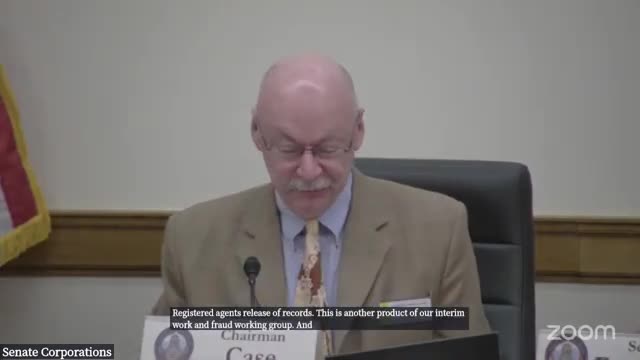Committee approves limited authority for assessors, treasurers to request confidential registered-agent records
Get AI-powered insights, summaries, and transcripts
Subscribe
Summary
Senate File 59, as amended, permits the Secretary of State to release confidential registered-agent records to county assessors or treasurers upon written application for official business and continues existing subpoena access for law enforcement; the committee voted 5-0 to advance the bill.
The Corporations, Elections & Political Subdivisions Committee advanced Senate File 59 after adopting revisions that limit and clarify who may obtain confidential registered-agent records and how the records may be used.
Under the committee—s version, the Secretary of State may release confidential records to a bona fide law enforcement agency pursuant to a court-ordered subpoena; it may also release the records "upon written application" to a county assessor or county treasurer for official business. Records released to assessors or treasurers would remain confidential and could be disclosed further only pursuant to a court-ordered subpoena or to law enforcement for a criminal investigation.
Secretary of State staff had earlier flagged due-process and confidentiality concerns with the original draft, and the office participated in negotiations that produced the amended language. "These amendments did clean that up and, we appreciate the committee's listening to our concerns of the original bill draft, which raised several due process concerns," the secretary's staff said.
County assessors told the committee they support the change because it helps them protect constituents who discover their home or business addresses listed on filings for entities they did not create. Dixie Huxtable, Commerce County assessor, described cases in which elderly residents received unexpected notices tied to business filings that listed their addresses. "When we reach out to those and we find out that those constituents know nothing about what we're talking about," Huxtable said, "we're just trying to look out for those folks and make sure there's something not coming down the pipe that's gonna hurt them even worse."
Committee members said the revised language narrows earlier drafts and includes confidentiality safeguards; the office emphasized it would act as the clearinghouse for requests and said records should be released only when properly documented.
Motion and vote: The committee voted by roll call to advance Senate File 59 as amended; the recorded vote was 5 ayes, 0 nays.
Why it matters: County assessors and treasurers said the authority helps them protect constituents and the local tax base by identifying filings that misstate addresses or list absentee residents. Secretary of State staff said the revised approach preserves confidentiality and existing due-process safeguards while improving intergovernmental cooperation.
Next steps: The bill was advanced from committee; sponsors said they expect the Secretary of State—s Office to continue to collaborate with county offices on procedures and to act as the gateway for requests for confidential records.
